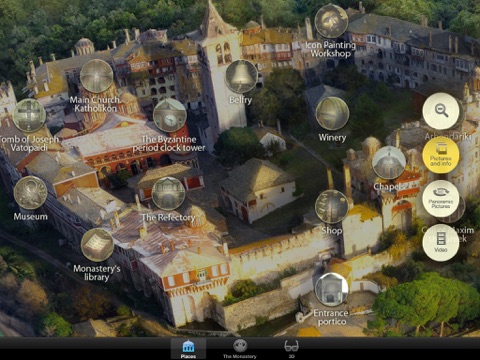
The Holy and Great Monastery of Vatopaidi on Holy Mount Athos
Unique virtual tour of the ancient monastery "Vatopaidi" on Mount Athos.
- Video, interviews with monks and abbots;
- An interesting historical material about the history of the monastery and its modern life;
- More than 600 photos, murals, icons, rare manuscripts in the library and museum of Vatopaidi.
- 3D photos and videos, panoramic views of the monastery and church.
The Holy Monastery of Vatopaidi is on a hill by the sea on the north-eastern side of the Athos peninsula. It was founded around 972 - 985, probably by three rich nobles, Athanasius, Nicholas, and Antony, who came to live the monastic life on the Holy Mountain in the time of St Athanasius, the founder of the Megiste Lavra. In the Second Typikon (1045) it held second place among the monasteries, a position which it has retained to the present day.
In the 12th and 13th centuries Sts Sabbas and Symeon, national leaders of the Serbian people, were monks of the Monastery. Among the many donations made to the Monastery in the 14th century by the Kral (Prince) of Serbia Stefan Dushan was the village of Ayios Mamas, and in the century which followed other Serbian princes continued the pious practice of making dedications and donations to the Monastery.
In the proud history of the Monastery there have also abeen difficult times, such as the raids and looting of Frankish pirates, Catalans (1307), and, later, Turkish tribes. However, misfortunes of this kind did not ultimately interrupt the advances made by the Monastery in its prosperity and prestige. On the contrary, at various times the Monasteries of Chalkeos, Veriotou, Ieropatoros, Kaletzi, St Demetrius, Xystrou, Tripolitou, and Trochala all came into its possession. Nor were the Byzantine Emperors slow in their generosity, while even Western leaders in post-Byzantine times interested themselves in the security of the Monastery.
In the late 15th century Vatopedi had as a member of its community the Apostle to the Russians, St Maximus the Greek. In 1749, the famous Athonite Academy was set up at the Monastery. This provided an education in difficult times for the Greek nation.
The fine katholikon is dedicated to the Annunciation of the Blessed Virgin, and was built in the 10th century. Its oldest wall-paintings (though painted over in the 18th and 19th centuries) go back to the 14th century. The Monastery has 12 chapels inside its precinct and 19 outside, of which five are incorporated into the katholikon. The Monasterys bell-tower was built around 1427 and is the oldest to survive on the Mountain. There have been frequent alternations, of short duration, between the coenobitic and the idiorrhythmic systems from as early as the late 14th century, but in 1989, Vatopaidi finally returned to the coenobitic way of life.
Among the Monasterys treasures, in its safekeeping since the 14th century, the Girdle of the Theotokos is particularly famous. A gift of great value to the Monastery is the Jasper cup, probably given by Manuel II Palaeologus, reputed to have the property of turning water into a milky antidote to snake bites. It also has many elaborate vestments and sacred vessels, and a number of miracleworking icons of Our Lady, such as the Elaiovrytissa, the Ktetorissa, the Esphagmeni, and the Paramythia adorn the monastery. The library contains approximately 2,000 manuscripts, 25 scrolls, a large number of documents and printed books - in excess of 35,000. The dependencies of Vatopaidi are 24 kellia the the historic Sketes of St Demetrius and of St Andrew (Serai) near Karyes. At present, the community consists of around 100 monks, many of whom are from Cyprus.



